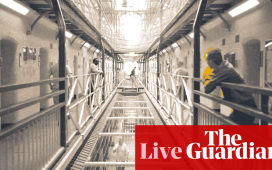The business secretary has refused to guarantee that blast furnaces in Scunthorpe will get raw materials in time, saying the emergency government action meant there was now a “high trust bar” for Chinese companies to invest in critical UK industries.
Jonathan Reynolds declined to directly accuse the British Steel owner Jingye of sabotaging the plant but it is understood ministers do not expect the company to return to any negotiations.
“It might not be sabotage, it might be neglect,” Reynolds told the BBC. “The conscious decision not just to not order raw materials, but to sell existing supplies of raw materials, is the significant change that required the government to step in.”
Reynolds said the costs to the economy of closing the plant and losing the country’s steelmaking capacity – plus the major job losses it entailed – would have been at least £1bn, more than losses expected from nationalising the plant.
A decision on full nationalisation is expected to be taken in the next fortnight if the plant can continue operation.
Reynolds told the BBC’s Laura Kuenssberg he would not “make my situation or the nation’s situation more difficult” by giving more details on whether the steel blast furnaces would be able to continue operating. If the furnaces run out of raw materials, they become obsolete.
Speaking the day after parliament passed a one-day bill taking emergency powers to gain control of the Scunthorpe site, Reynolds said the UK had “given ourselves the opportunity, we are in control of the site, my officials are on site right now to give us a chance to do that”.
But he said it was too commercially sensitive to confirm either way whether the government could guarantee the plant would continue operating.
The Chinese company Jingye, which bought British Steel in 2019, had stopped ordering more raw materials and began selling off the supplies it already had, declining an offer of £500m in support and refusing to guarantee the furnaces could continue operating.
“It became clear to me and to the government, no financial offer of any generosity would have been accepted,” Reynolds said. “This was the situation on the 10th of April, on the Friday we had agreement from the cabinet. On Saturday, parliament was recalled, and here we are.”
The business secretary told Sky News there was now a “high trust bar” for bringing Chinese investment into the UK and said he would not have allowed a Chinese company to invest in the “sensitive” steel sector.
Reynolds said the company had annual losses of £233m and that figure “can be improved upon”. But he said the cost of nationalisation had to be compared with the cost of allowing the plant to go under.
He said it would not mean any further borrowing to nationalise the plant. “We’ve got an allocation in the first budget for a steel fund of over £2.5bn. If we are spending some of that money to support, in the short term, steel, I think that’s better for the taxpayer than spending a greater sum of money on a transition with a company I’m not sure right now I could rely on, or to be frank … the complete collapse of British Steel, with a cost to the exchequer of many multiples [of that].
“If that had gone down, that number of jobs, the land remediation, support to those who lost their jobs, that would be well over a billion pounds.”
Reynolds said he would not make accusations of Chinese state interference, but said the company was “not [acting] in the kind of rational way we’d expect a company to operate in a market economy”.
The Reform UK leader, Nigel Farage, accused Jingye of lying about the companies’ accounts and said he was “100% certain” the Chinese government had ordered Jingye to buy British Steel in order to close the business. Farage offered no evidence for those accusations but said it was based on his “intuition”.
“Why do you think that, yesterday morning, the trade unions acted to stop the Chinese officials even getting their cars into the plant? Because they feared industrial sabotage,” Farage said.
The GMB trade union general secretary, Gary Smith, confirmed workers had acted to stop the company gaining access.
“We were worried about industrial vandalism and there was a worry about sabotage on the site, quite frankly,” he said. “And yesterday, workers did prevent executives from the Chinese owners from going on site.
“I’m sure that people are still very worried about that, but these people performed heroics yesterday to ensure that we’ve got a fighting chance for the steel industry in this country. They were legitimately concerned about industrial sabotage.”











